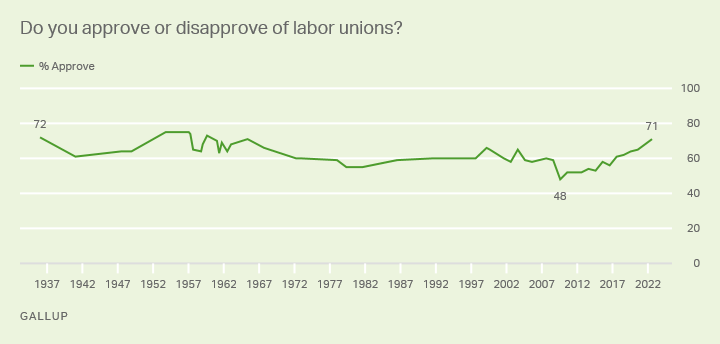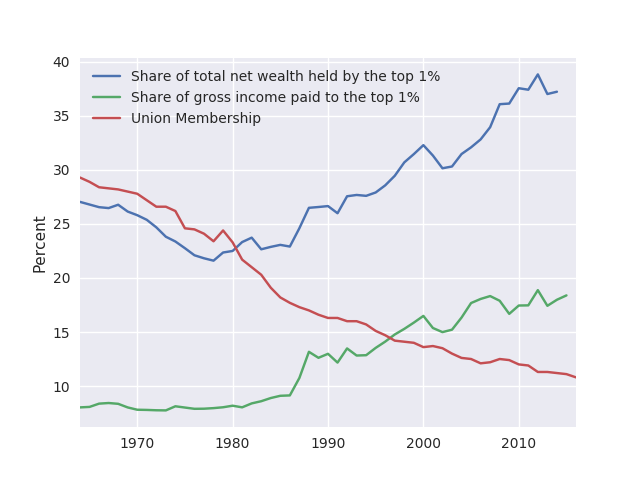Employers - big and small - will pay their employees whatever the market will bear, which is NOT as little as they will accept because then your employees will gain some experience and quit for another job.
Depends on the company. I've worked for conscientious employers, and exploitative employers.
And BTW, nobody holds a gun to your head and says you will work here and we'll pay you as little as possible,
What you don't understand is that not everyone has the luxury of quitting. some people have jobs in areas not so easy to find a comparable job, while, at the same time, they have mouths to feed. Please reread my comment on 'bargaining parity'.
in this country you can tell them to go to hell anytime you want to.
See above.
And then there's the staffing and training issue: if your business has a high turnover rate for your employees then you're spending a lot money to find, hire, and train people to do the job.
I'm 72, had a lot of jobs when I was young before I settled into a career that led to self employment (I owned a few costume jewelry concessions and later became a wedding photographer). You'd think what you are saying is obvious to some employers, but my experience is that it just isn't true. Some are conscientious, some are exploitative.
I think you'll find that for most businesses you actually save money in other ways by paying your people more than the going market rate.
I only know what I know from my own experience.
You do understand that higher labor costs will drive up the price of the product or service, right?
Depends on the industry and how big the increase is. In an industry where labor is about, say 17% and you pay a quarter raise (not great, but welcome in '73) this might result in having to charge only a little extra on the retail end and demand was hardly affected. It all depends. I've owned businesses, both products and services, and my experience tells me that retail pricing is based more on demand and less on costs. Sure costs are factored, but if demand is soft, and can't justify the cost, the product is price slashed sold at cost or at a lost to make way for another product more in demand. Costs DO NOT determine retail (as much as), DEMAND does insofar as products which stay on the shelves. If costs increase a little, and demand won't be softened by a slight increase, then costs affect pricing, but see, it depends on degree. What I'm trying to say is that demand has more impact on pricing than costs do. Prices are set by that price which yields the most profit, it might be X price, or X plus 1, where costs hasn't varied. Demand is impacting the price, not costs (or not as much). If costs rise, we will see if a slight price increase to recover our extra costs is doable, but if it slows demand reducing profit more, then we back off and accept the smaller profit. That profit sweet spot is determined much more by demand than costs.
That is the primary reason why foreign countries can make products and ship them over here and at a lower cost than the same domestic product. And don't try to tell me the domestic product or service is of better quality and therefore worth more, cuz it isn't.
Yeah, foreign competition is a problem where labor is much cheaper. Thing is, foreign labor is radically cheaper. on the retail end, depending on the industry, I might support tariffs. But I do not support tariffs on raw materials.
Federal law says that employees can unionize anywhere, but they cannot force people to join it or pay dues. It's not like the union has to represent every employee whether they are dues-paying members or not. They can decide not to support me and I can decide not to join their union. And I see nothing wrong with that.
Well, having been a member of a few unions, not many, but a few, this is my take on it:
The statement is generally correct in terms of federal labor laws in the United States. Employees have the right to unionize under the National Labor Relations Act (NLRA) regardless of whether they pay union dues or not. However, there are a few important points to consider:
First, while unions cannot force employees to join or pay dues, they are still required by law to represent all employees in the bargaining unit, including those who choose not to join or pay dues. This is because unions are legally obligated to represent all employees in the bargaining unit equally, whether or not they are union members.
Second, while unions cannot force employees to join or pay dues, they can negotiate contracts that require all employees in the bargaining unit to pay "fair share" fees. These fees are designed to cover the cost of collective bargaining and representation for all employees in the bargaining unit, regardless of whether they are union members or not. In some states, unions can also negotiate contracts that require employees to pay full union dues as a condition of employment.
Third, while employees have the right to decide whether or not to join a union, there may be benefits to joining, such as increased bargaining power, better wages and benefits, and greater job security. Non-union employees may not have access to these benefits, and may also be more vulnerable to employer retaliation for engaging in protected union activities.
And so, while employees have the right to decide whether or not to join a union and pay dues, it is important to understand the legal obligations of unions to represent all employees in the bargaining unit, and the potential benefits of union membership.




